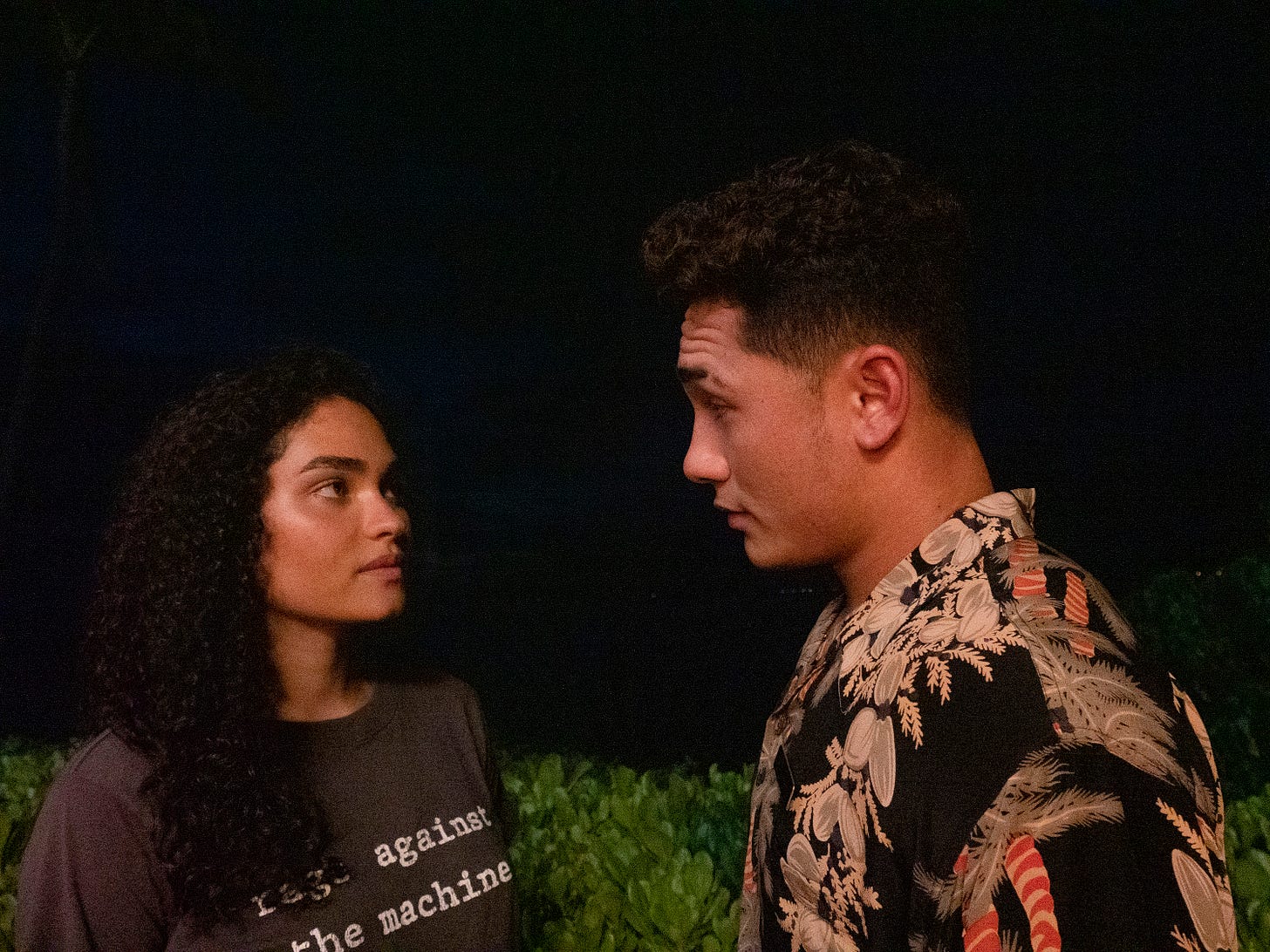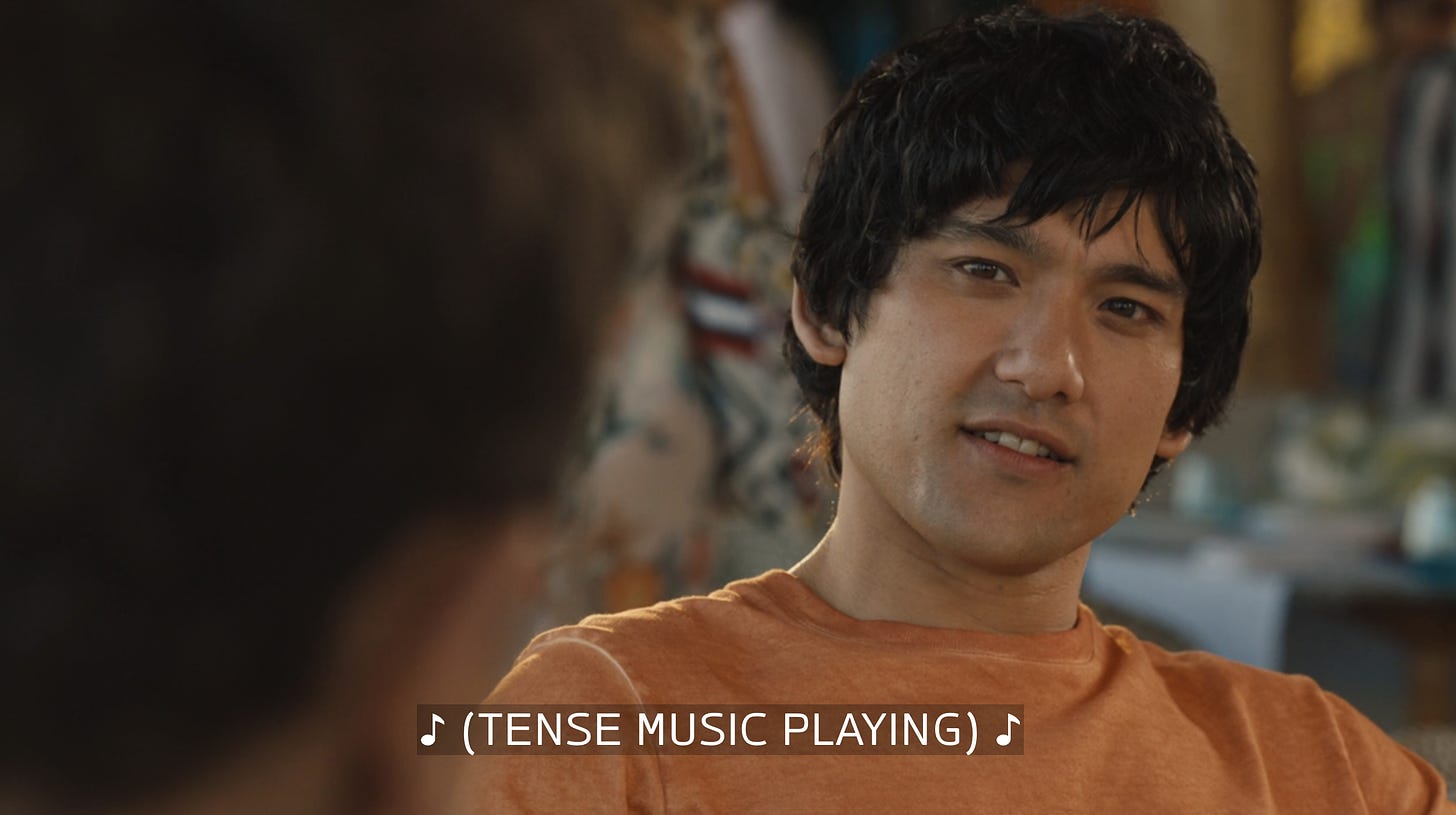Let's be real: The White Lotus isn't that good.
Mike White's anthology television series attempts to critique wealth and whiteness with satire but fails. I can't be the only one that sees through its shiny and well-produced veneer?
When the first season of The White Lotus dropped week to week during the summer of 2021 I had no desire to watch it. The show was filmed on location in Hawai’i, a place where Native Hawaiians have been asking people not to visit. Still, HBO needed content and if I had enough money to spend on frivolous things, I would bet that 90% of the top streaming and production company execs have no idea of the everyday requests of Indigenous communities in the locations where they film. Francesca Orsi (EVP and Head of Drama at HBO) stated at the season one premiere that because of the complete shutdown of the industry in 2020, the 2021 calendar was empty. Hm, is that because of the global pandemic? Yes. But Orsi along with another content exec at HBO named Casey Bloys couldn’t keep re-marketing The Sopranos over and over! They needed something new, something fresh — something that critiqued exploitation and neocolonization while adding to it!
What changed my mind? What caused me to watch a show that felt hypocritical? Let’s be real: I’m a whore for television. I wake up and read the trades every morning. I rewatch my comfort shows over and over. I love learning about the inspirations that caused writers, showrunners, and directors to put a little piece of themselves in a 28 minute episode. I pay attention to the award shows and get delight out of disagreeing with the Television Academy. When The White Lotus won 10 awards and walked away as the most awarded series at the 74th Primetime Emmy Awards, I had to find out what the big deal was.
Let me backup a second for anyone that is reading and didn’t watch the first season of The White Lotus. (I’ll try my best not to spoil anything but there are no promises so keep reading at your own risk):
The entire first season follows various vacationers who have come to The White Lotus, a fictional luxury hotel chain, on the island of Maui. There are honeymooners (Alexandra Daddario and Jake Lacy), a wealthy family that is split not just by generational beliefs but also politics (Connie Britton, Fred Hechinger, Sydney Sweeney, and Steve Zahn), the wealthy family’s college-age daughter’s ethnically ambiguous friend (Brittany O'Grady), and a mourning woman with so much money she doesn’t know what to do with it (Jennifer Coolidge). Adding to the ensemble are those who work in the hotel including the zany manager (Murray Bartlett) and the spa manager (Natasha Rothwell) who is looking to do something more than be around rich white people.
You know who is almost completely left out of the entire story? Native Hawaiians. Ironic, considering the show is supposed to be a clever critique some have called “Tackling White Privilege Against Hawaiian Backdrop.” They really emphasize the Hawaiian backdrop part. Not saying there are no Indigenous characters. In fact, there’s one!
Meet Kai:
Kai (Kekoa Scott Kekumano) is a surfer boy who works at the hotel. He and Paula (Brittany O'Grady)—the ethnically ambiguous friend of the rich college girl on vacay with her family—start to sneak around at night to pray. Just kidding, they do not pray. They do that one thing that my religious trauma doesn’t really allow for me to talk about in a public forum.
One night Kai opens up about how the neocolonization (my words, not his) from hotels like The White Lotus has directly hurt his family but they don’t have the funds to fight against the developers. Brilliantly, Paula comes up with a plan in which Kai breaks into the safe where the family keeps these bracelets that are worth $75,000. You know, because if he sells these bracelets then Kai and his family can get back their land. But Paula is not as pro-Land Back as she seems. She gets the code to the safe by acting as sketchy as possible and then does nothing when the parents decide to go back to their hotel room right around the time Kai is robbing them. Yes, he gets caught and blamed for the whole thing. In fact, the rich parents act like it was the most traumatic event that has ever happened to them (ironic on so many levels!!!)
After Kai is caught in the hotel room, his story ends. Paula even takes the necklace that he gave her when they came up with the whole grand theft scheme and throws it in the ocean. His entire presence in The White Lotus is used similarly to that of a manic pixie dream girl: to further the plot and point out that wealth, whiteness, and neocolonization all are in collaboration with each other.
Brooke Obie summarized my issues with season one in her review:
“In the characters’ fight for power, the rich white people emerge victorious as ever, the exploited white hotel manager winds up dead, and the Black and Hawaiian characters barely even get to play. This is, after all, a six-episode story about white people for white people, created, written and directed by one white man, (pun inherent) Mike White.”
Isn’t it glaringly obvious that the irony the show relies on falls a little short because there is a lack of lived experience from the creator who also wrote and directed every single episode? I guess it isn’t, considering this same use of satire and self-critique is what the show is being praised for.
I’m not saying I’m against one creator writing and directing their own mini-series. A great example of when this really works is Flowers, a British dark-comedy that examines mental health and family relationships. Funny enough, the creator who also wrote and directed every episode is Will Sharpe, who is one of the lead cast members of The White Lotus season two (which I will get to after one more point). As new challenges rise up in the television production world—especially for writers or those of us that are trying to break into writing for television—a white guy taking up the space (and money) that Mike White is allowed is the ultimate example of privilege.
Diversity, or at least the appearance of inclusion, has been trendy the last few years. While numbers are getting a little better in the television world, there is still a lot more tokenism than actual equity. The issues with the landscape are nuanced and I am not trying to make this post too long and unreadable, but I’m going to recommend everyone take a look at this report that came out earlier this year. It does a great job at highlighting the harm that still exists in the world of television writing.
Now for Season 2…
A majority of my complaints about season one have to do with the critique of whiteness from a white guy so what about season two? They didn’t even really address race!! And for that I am thankful.
Season two is a whole different bag of misplaced plot lines and unanswered questions. I will say I enjoyed this season much more and thought the cast did an outstanding job with what they were given. Here are some of my quick thoughts:
I find it hard to believe…
Aubrey Plaza looks like someone named Harper
that Harper and Ethan would ever have issues in the bedroom
Ethan is white passing
Again, I’m getting ahead of myself so let me backup. The second installment of The White Lotus follows rich people on vacation in Italy. You have an Italian-American grandfather, father, and son who are looking to rediscover their roots, a wealthy lady and her 20-something assistant, and two couples that are there together despite them not really knowing each other. Of course there are the understated employees: the closeted manager who has a crush on one of her employees and two sex workers who are attempting to extract money from silly American tourists.
The storyline I liked the most is also my biggest gripe. I was intrigued by the two couples that barely knew each other yet decided to frolic off to Europe together because they can. Cameron (Theo James) and Daphne (Meghann Fahy) are your typical looking rich duo. He thinks his hotness allows him to wear some of the ugliest clothes because the price tag was more than my Brooklyn apartment rent and her hair is perfectly curled and paired with Gucci and other designer names at all times. They are insufferable but don’t really care. Ethan (Will Sharpe) knows Cameron from college and after selling an app that lands him in a pile of money, he and his wife Harper (Aubrey Plaza) join the former two across the ocean blue.
What’s funny is that it is obvious from the very beginning that Ethan and Harper don’t like the people they are on vacation with. Harper is much more cynical and Ethan encourages her to give them a chance. Their communication at the beginning shows that they have an intimacy that while it doesn’t translate to physical activity is also very important in marriage. In fact, Ethan would rather watch porn than do that thing that couples do. This fact doesn’t make sense because their chemistry and cute little banter in the first episode gives me no reason to believe they are not getting freaky.
The tension that is set up with these two couples is good and if the entire season had focused on just them, I think it would have been fantastic. Again, the actors really bought into the characters they were playing. I don’t care about Portia and her British boy toy or the gays and Tanya and I especially thought the whole “going to Italy to see where our roots are journey” is good in concept but really underdeveloped. And finally, I didn’t love Mia and Lucia only because they felt like a hollow hologram of female-empowerment. Am I happy that Lucia scammed $50,000 or however much from the rich guys? Hell yeah! But imagine if Mike White had hired someone with more vision that could have brought both Mia and Lucia’s characters to a whole different level.
My last point about Ethan and Harper is that they are the only people of color. Given my problems with Mike White's handling of the Native Hawaiians in season one, this is probably a good thing. Will Sharpe, who plays Ethan, is Japanese and Aubrey Plaza, who plays Harper is Puerto Rican. They are also newly rich, meaning that they have not been jaded by the wonders of money. While race or ethnicity between these four is never explicitly talked about other than a subtle line where Harper mentions to Ethan they are “white-passing”. Still, the creative behind this show doesn’t really understand the commentary he is placing on these characters and while the actors in these roles are incredibly talented, they can only do so much with what they are given. Here’s a fun Reddit thread that gives some insight on how their diverse status plays into the way Cameron and Daphne interact with Ethan and Harper.
I truly wish that the scenario of Ethan and Harper and Cameron and Daphne going on a vacation together had been the only focus or even a feature-length film written and directed by someone like, I don’t know, even Will Sharpe himself? Yes, this is now a Will Sharpe fan newsletter: you’re welcome.
That’s the conclusion to my messy thoughts about The White Lotus. Overall, I don’t think the show takes the satire to the necessary level in order to correctly comment on the intricacies of wealth. And without a doubt, The White Lotus is not equipped to be as critical as necessary to show how capitalism and colonization feed off of inequality.
Suggested reading to expand on some of the topics I bring up:
The White Lotus is as clueless about Native Hawaiians as its characters by Mitchell Kuga
The White Lotus is supposed to be satire. Hawaiians deserve the last laugh. by Mariah Rigg
THE WHITE LOTUS ISN’T A BAD SATIRE, IT’S JUST A BAD SHOW by John Ganz
Native Hawaiians hit by missing and murdered scourge by Jennifer Sinco Kelleher
‘The White Lotus’ review: Season 2 jets to Sicily for another rendition of Rich People Talking by Nina Metz







